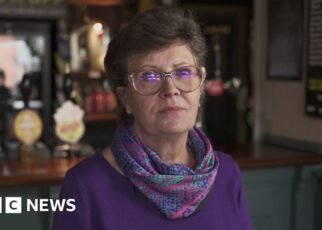[ad_1]
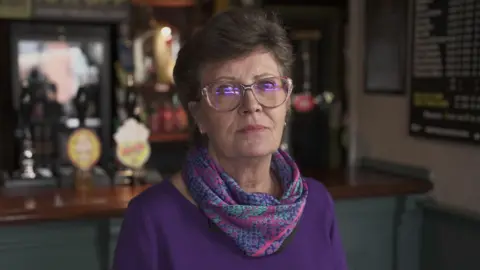 BBC
BBCA survivor of the 1974 Birmingham pub bombings said she still carries the psychological scars of the atrocity 50 years on.
Twenty-one people died in The Mulberry Bush and the Tavern in the Town after a vague IRA warning gave inadequate time to evacuate. Another 220 people were injured.
Robyn Tighe, who had just turned 19 when she was caught up in the blasts, told a new BBC documentary: “I’m a survivor with scars.”
Memorial services are being held in Birmingham on Thursday to mark the anniversary of the bombings, for which no-one has been held responsible.
Although six men from Northern Ireland – known as the Birmingham Six – were found guilty in 1975, their convictions were quashed in 1991.
Robyn had gone to the Tavern in the Town on 21 November 1974 hoping to bump into a prospective boyfriend before he started his factory night shift.
The lively underground pub drew a young crowd with its western theme and eclectic music.
“There’s always a place to be seen, isn’t there?” she said. “And the Tavern was one of those.”
She ordered her usual half a bitter and settled in by a large wagon wheel wall decoration, chatting to friends while she waited for him to appear.
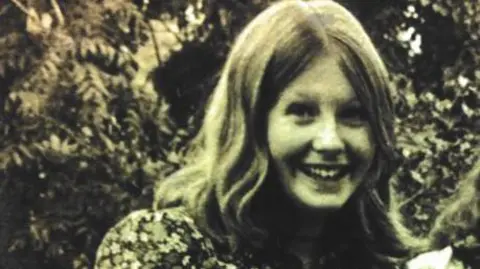 Family Handout
Family HandoutJust after 20:00 GMT they heard a rumbling sound, but dismissed it as a passing bus.
Only later would Robyn realise it was the first bomb detonating at the nearby Mulberry Bush, at the base of the Rotunda building.
Minutes later, the Tavern went black.
“There isn’t a sound when you’re that close to a bomb of those proportions,” she said.
“It overtakes your whole body. It’s a vibration, but it’s not a fast vibration. It’s a deep underground sort of vibration that goes through your body.”
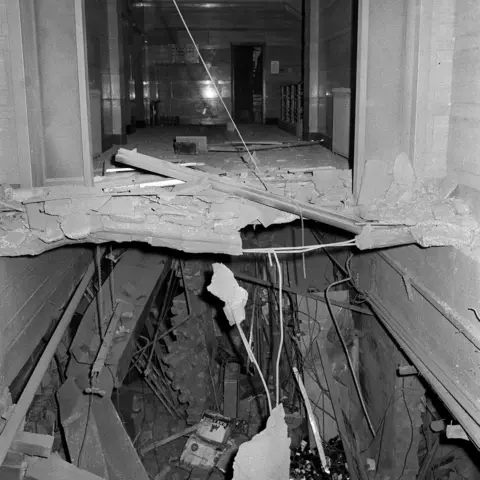 PA Media
PA MediaRobyn felt herself propelled forward, but fell unconscious. When she woke up, she was surrounded by rubble and burning fragments of phosphorus.
“The wagon wheel pushed me forward. Maybe it saved me, maybe it covered me, protected me from more of the blast,” she said.
“My instinct just said get out, get out, get out, and I just climbed and climbed towards the light at the top [of the stairs].”
While she considers herself lucky to have escaped life-changing physical injury, the psychological toll has affected her deeply and she has experienced post-traumatic stress disorder (PTSD).
“It’s only really in the last couple of years that I’ve properly felt that I’ve got over my PTSD,” she said.
“I don’t like going into enclosed spaces, into buildings. It’s affected my whole life.”
‘It will stay with me forever’

Shortly after the explosions, 25-year-old police constable Eric Noble was called urgently to the city centre from Birmingham Airport.
He had been one of more than 100 officers deployed to cover the repatriation of IRA man James McDade, who died the previous week when a bomb he planted in Coventry detonated.
“We didn’t know exactly what had happened [in the city centre] but we suspected it was serious because of the urgency,” he recalled.
The gravity of the situation hit him as he locked up his van outside Digbeth police station.
“I came across a taxi driver carrying a tarpaulin from his boot. And I saw body parts,” he said.
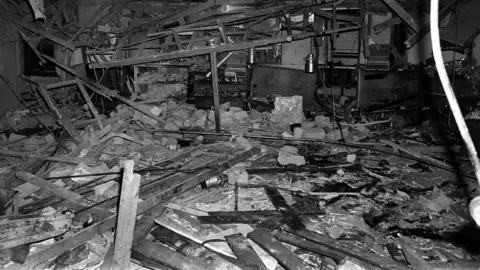 PA Media
PA MediaHe arrived at the Mulberry Bush to find it “eerily” quiet.
Officers erected a cordon and then began the grim task of attending to the dead.
“The removal of the bodies and the body parts from the scene was really the worst part, the most horrific part,” he said.
“One of our unit didn’t want to handle the bodies and we respected that. But the rest of that realised the importance of doing it and doing it respectfully.”
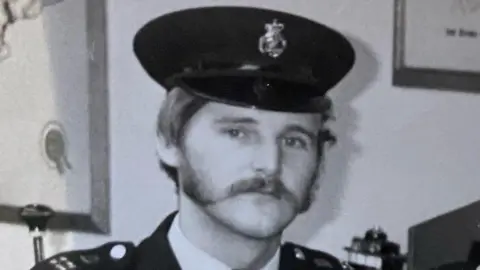 Family Handout
Family HandoutHe recalled how they made three trips to a chaotic mortuary, saying: “It’s hard to explain how horrific the situation was. And the policemen doing their best in what can only be described as mayhem.”
After finishing around midnight, he went with other officers to an Irish pub near the station.
“In those days there was no counselling,” he said. “Having a drink together and letting our hair down – it’s probably the way we dealt with things.”
Eric, who retired as a chief inspector in 1998, remembers the night as the most horrific of his 30-year career.
He said: “The only time [my wife] ever saw me overcome with emotion was when I got back that night from the Birmingham pub bombings.”
[ad_2]
Source link freeslots dinogame telegram营销
